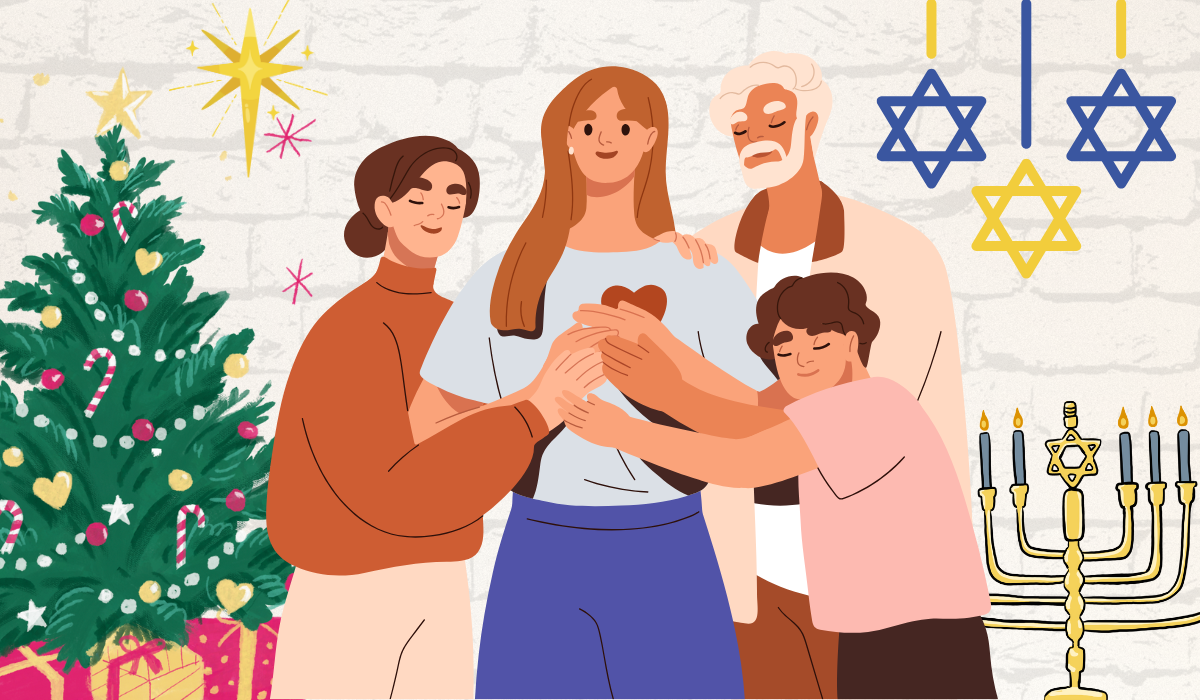Christmas and Hanukkah Overlap This Year. Rabbi Yoshi Zweiback Says It’s a Chance to Remember What Binds Us Together
I work at a large synagogue in Los Angeles, and I‘m blessed to be surrounded by extraordinarily creative and talented people. The other day, I found myself in a beautiful recording studio, collaborating with colleagues on a project for our early childhood center. Together, we were recording a medley of beloved Shabbat songs.
One of these cherished favorites is called “Shabbat Feeling.” The leader sings: “I’ve got that Shabbat feeling up in my…” and then pauses for a child to raise their hand and name a body part where they feel that Shabbat joy: “in my legs,” “in my head,” “in my heart.” It’s a staple in Jewish preschools and synagogues across North America—songs that most Jewish parents of toddlers would recognize from their own childhoods.
As our cantor was recording the verses in the vocal booth, I noticed the engineer quietly singing along, but with different words. He sang: “I’ve got that love of Jesus, love of Jesus deep in my heart!”
“Stuart,” I asked, “where did you learn that version of this song?”
He shrugged and replied, “At Bible camp when I was a kid.”
At that moment, I realized that the song I had sung since my own childhood was probably borrowed by our Jewish community from our Christian brothers and sisters—or perhaps the other way around. Who knows?
What was beautiful was the realization that something sentimental and meaningful from my childhood was equally sentimental and meaningful from his. One version of the song celebrates the joy and happiness we Jews feel on Shabbat, the day of rest. The other expresses the joy and happiness Christians feel when they reflect on their love for Jesus. While there are certainly meaningful theological differences between these two expressions of faith, both share a profound sense of gratitude for creation, for time, and for the gift of life itself.
I’ve been reflecting on that moment over the past few days. What is clear to me is that what binds us together—what we share—is so much deeper than what divides us.
This thought feels especially poignant and urgent as the holiday season approaches.
This year, Christmas and Hanukkah coincide—a rarity, as the Jewish calendar is lunar and doesn’t always align with the Gregorian one.
Both of these holy days mark historic occasions. Hanukkah predates Christmas, commemorating events in the second century BCE. In the darkest time of the year, Jews living in the Land of Israel experienced a terrible setback: the Seleucid rulers of that day desecrated the Jewish Temple in Jerusalem, preventing the community from observing its faith and its traditions. While smaller in number, the Jews fought back and drove the Seleucid rulers out, rededicating the Temple by lighting the sacred Menorah, the special candelabra that stood in the sacred place. In the darkness, they kindled the light.
A hundred and thirty or so years later, in that same Land of Israel, a child was born that would, according to Christian tradition, drive away the darkness for all humanity.
Hanukkah reminds us Jews of the miracle of our survival and very existence. Christmas reminds Christians of God’s commitment to bring the light of salvation to a broken world.
A powerful, contemporary expression of this light in the darkness is the extraordinary friendship that has blossomed between Christians and Jews in recent years. Centuries of theological rivalry, often expressed violently, have transformed into meaningful, lasting partnerships that have not only transformed our communities but the larger world as well.
There was nothing obvious, inevitable, or expected about any of this. If you had told my ancestors, who emigrated from Eastern Europe to the United States at the turn of the 20th century, that harmony between Christians and Jews would someday be the norm, they would have been incredulous, they would have thought you to be a wide-eyed dreamer.
In the shtetl communities my ancestors fled, Christmas and especially Easter were times of fear and trembling. A local Christian cleric might deliver a sermon on the Jewish rejection of Jesus, stirring rage and inciting pogroms.
Thankfully, we have moved far beyond such a time. In my home city of Los Angeles, I count many Christian colleagues as important allies and the dearest of friends. Together, we work on issues like combatting homelessness and poverty, promoting education for all of our children, and working together to bring peace and security to Israel and the broader region, with a special focus on preserving the vanishing Christian communities in the Middle East.
As a student of Jewish history and as a Jew who lost dozens of family members in the Holocaust, this transformation strikes me as not just evidence of humanity’s capacity for progress in a world often marked by cruelty and despair. I see it as something unexpected, improbable, and awe-inspiring—in other words, a miracle.
May such miracles continue to increase, so that through our example, people of all faiths and backgrounds might come together in respect, compassion, and love.
This is the light we so desperately need to dispel the darkness of our deeply divided times.
Merry Christmas and Happy Hanukkah to all!
Rabbi Yoshi Zweiback is Senior Rabbi at Stephen Wise Temple, as well as an author, lecturer, podcaster, musician and composer. He is also the volunteer Executive Director and Founder of Kavod, a Tzedakah Collective nonprofit dedicated to protecting human dignity.
Please note that we may receive affiliate commissions from the sales of linked products.



